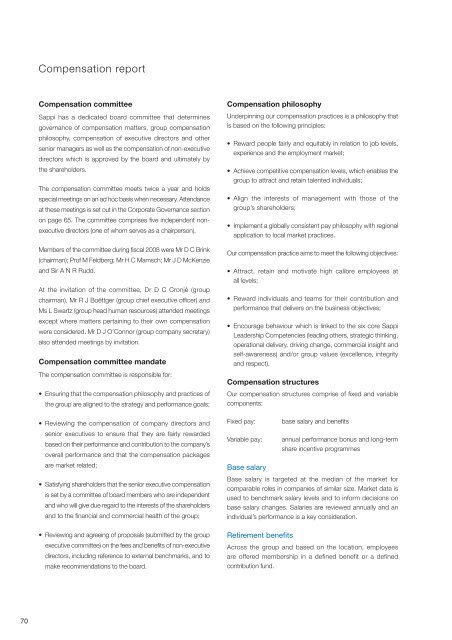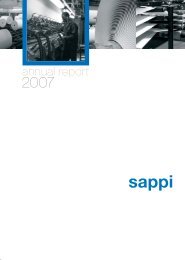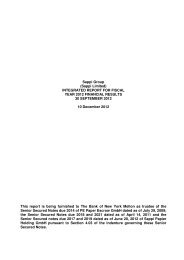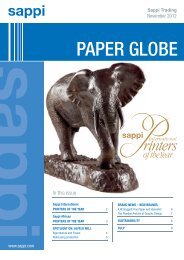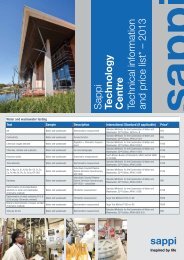2008 Annual report - Sappi
2008 Annual report - Sappi
2008 Annual report - Sappi
Create successful ePaper yourself
Turn your PDF publications into a flip-book with our unique Google optimized e-Paper software.
Compensation <strong>report</strong><br />
Compensation committee<br />
<strong>Sappi</strong> has a dedicated board committee that determines<br />
governance of compensation matters, group compensation<br />
philosophy, compensation of executive directors and other<br />
senior managers as well as the compensation of non-executive<br />
directors which is approved by the board and ultimately by<br />
the shareholders.<br />
The compensation committee meets twice a year and holds<br />
special meetings on an ad hoc basis when necessary. Attendance<br />
at these meetings is set out in the Corporate Governance section<br />
on page 65. The committee comprises five independent nonexecutive<br />
directors (one of whom serves as a chairperson).<br />
Members of the committee during fiscal <strong>2008</strong> were Mr D C Brink<br />
(chairman); Prof M Feldberg; Mr H C Mamsch; Mr J D McKenzie<br />
and Sir A N R Rudd.<br />
At the invitation of the committee, Dr D C Cronjé (group<br />
chairman), Mr R J Boëttger (group chief executive officer) and<br />
Ms L Swartz (group head human resources) attended meetings<br />
except where matters pertaining to their own compensation<br />
were considered. Mr D J O’Connor (group company secretary)<br />
also attended meetings by invitation.<br />
Compensation committee mandate<br />
The compensation committee is responsible for:<br />
• Ensuring that the compensation philosophy and practices of<br />
the group are aligned to the strategy and performance goals;<br />
• Reviewing the compensation of company directors and<br />
senior executives to ensure that they are fairly rewarded<br />
based on their performance and contribution to the company’s<br />
overall performance and that the compensation packages<br />
are market related;<br />
• Satisfying shareholders that the senior executive compensation<br />
is set by a committee of board members who are independent<br />
and who will give due regard to the interests of the shareholders<br />
and to the financial and commercial health of the group;<br />
• Reviewing and agreeing of proposals (submitted by the group<br />
executive committee) on the fees and benefits of non-executive<br />
directors, including reference to external benchmarks, and to<br />
make recommendations to the board.<br />
Compensation philosophy<br />
Underpinning our compensation practices is a philosophy that<br />
is based on the following principles:<br />
• Reward people fairly and equitably in relation to job levels,<br />
experience and the employment market;<br />
• Achieve competitive compensation levels, which enables the<br />
group to attract and retain talented individuals;<br />
• Align the interests of management with those of the<br />
group’s shareholders;<br />
• Implement a globally consistent pay philosophy with regional<br />
application to local market practices.<br />
Our compensation practice aims to meet the following objectives:<br />
• Attract, retain and motivate high calibre employees at<br />
all levels;<br />
• Reward individuals and teams for their contribution and<br />
performance that delivers on the business objectives;<br />
• Encourage behaviour which is linked to the six core <strong>Sappi</strong><br />
Leadership Competencies (leading others, strategic thinking,<br />
operational delivery, driving change, commercial insight and<br />
self-awareness) and/or group values (excellence, integrity<br />
and respect).<br />
Compensation structures<br />
Our compensation structures comprise of fixed and variable<br />
components:<br />
Fixed pay:<br />
Variable pay:<br />
base salary and benefits<br />
annual performance bonus and long-term<br />
share incentive programmes<br />
Base salary<br />
Base salary is targeted at the median of the market for<br />
comparable roles in companies of similar size. Market data is<br />
used to benchmark salary levels and to inform decisions on<br />
base salary changes. Salaries are reviewed annually and an<br />
individual’s performance is a key consideration.<br />
Retirement benefits<br />
Across the group and based on the location, employees<br />
are offered membership in a defined benefit or a defined<br />
contribution fund.<br />
70


